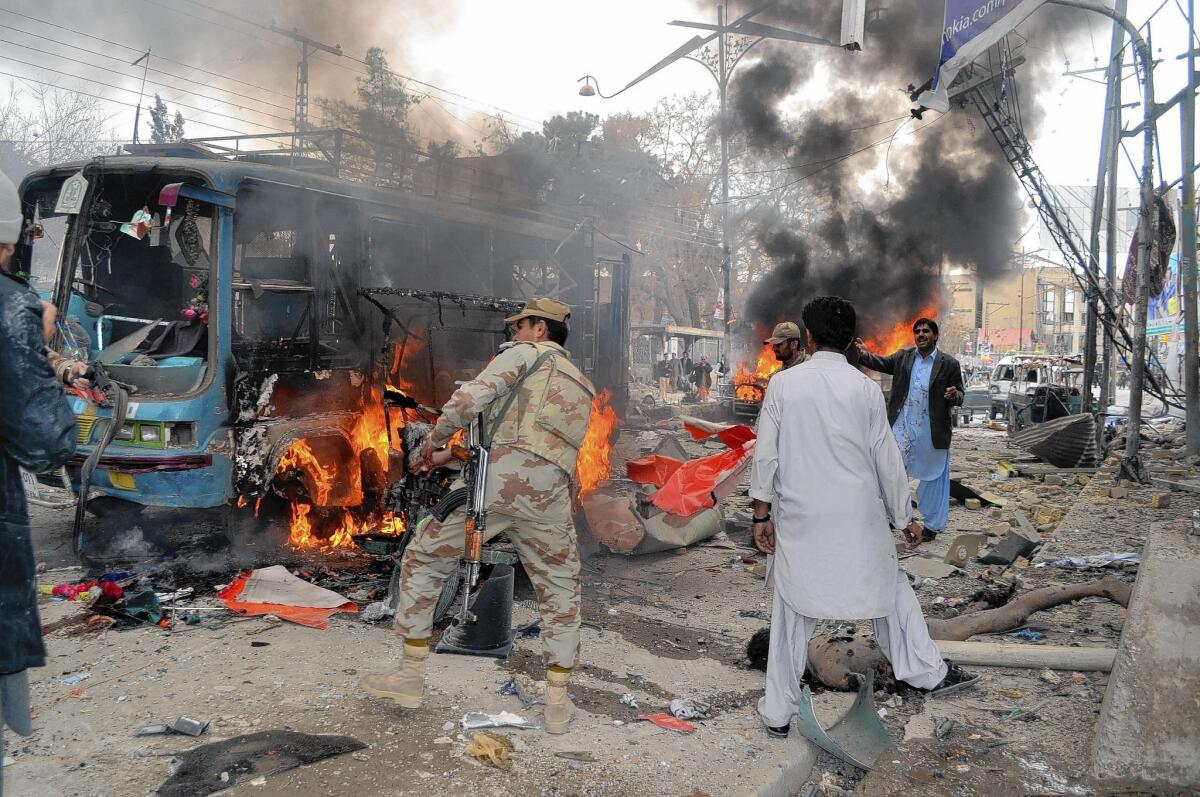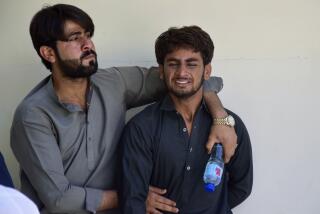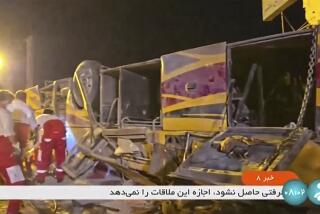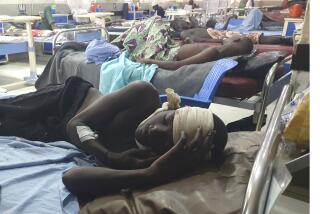Pakistan militant group takes responsibility for two bombings

PESHAWAR, Pakistan — A little-known Islamist militant group took responsibility for twin bombings hundreds of miles apart Friday that killed at least 19 people, wounded dozens and underscored the vulnerability of the Pakistani government’s attempt to open peace talks with insurgents.
In the provincial capital of Peshawar, near the northeastern tribal areas that border Afghanistan, a suicide bomber blew himself up in a bustling market on the city’s outskirts as worshipers were gathering for prayers. Nine people were killed and 30 injured, police and hospital officials said.
Nearly 400 miles away in the city of Quetta, at least 10 people were killed and 31 wounded when a bomb planted on a bicycle exploded in front of a college on a busy road, police said. Most of the victims were riding in a bus but officials said the target could have been a vehicle belonging to the paramilitary Frontier Corps, which had passed by the spot just moments before the blast.
A militant group called Ahrarul Hind claimed responsibility for both attacks in a telephone statement to reporters in the North Waziristan tribal area. It was the same group that said it had carried out a brazen raid March 3 on a judicial complex in Islamabad, the capital, in which 11 people were killed.
Ahrarul Hind broke with the Pakistani Taliban — the umbrella organization for a fractious array of militant groups battling to impose Islamic law in Pakistan — two months ago, saying it was opposed to starting negotiations with the government. The group issued a statement saying it would continue its struggle until sharia, or Islamic law, was implemented across the country.
In February, a spokesman for the group told the Long War Journal website that “sharia can never be attained through talks” and said the group’s “activities will be concentrated in major cities” to demonstrate the militants’ strength in urban areas, not only Pakistan’s lawless tribal regions.
The central leadership of the Pakistani Taliban — known in Urdu as Tehreek-e-Taliban Pakistan, or TTP — has distanced itself from Ahrarul Hind and this month called for a cease-fire to advance negotiations. But bombings have continued.
“The attack reflects a weakness of the TTP, showing a lack of unity in its ranks,” said Intikhab Amir, a Peshawar-based journalist who closely tracks militant groups in the region.
“This could be used by the government negotiators to put pressure on the TTP,” Amir added. At the same time, it indicates that any deal the TTP reaches with Islamabad stands little chance of being observed by splinter groups.
Prime Minister Nawaz Sharif’s government, which briefly suspended the peace initiative last month after militants reportedly executed 23 paramilitary soldiers in their custody, has resumed efforts to push the talks forward. On Thursday, two negotiators nominated by the TTP met with the group’s central leadership in Miram Shah, in North Waziristan.
Pakistan’s powerful military has refrained from criticizing Sharif over the negotiations, but Friday’s bombings appeared to be the latest to target the country’s security forces. Police official Najeebur Rehman said the bomber struck a police armored personnel carrier that was parked in Serband Bazaar, a town near the volatile Khyber Agency tribal area. Four officers were among the injured.
“We believed that bomber planned to attack police forces,” Rehman said.
Doctors at Peshawar’s Lady Reading Hospital said that women and children were among the dead and wounded.
Twelve-year-old Kamran Khan, who was injured in the bombing, said that he had parked his handcart at the bazaar when the explosion occurred. “People started running haphazardly for their life,” he said.
Special correspondent Ali reported from Peshawar and Times staff writer Shashank Bengali from Mumbai. Special correspondent Aoun Sahi in Islamabad contributed to this report.
More to Read
Sign up for Essential California
The most important California stories and recommendations in your inbox every morning.
You may occasionally receive promotional content from the Los Angeles Times.










